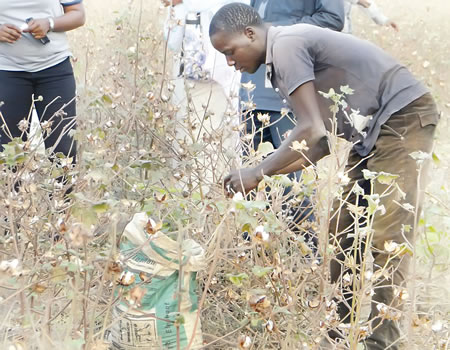
THE Nigerian textile industry is set to revive following the release of two high yielding genetically modified (GM) cotton species, known as BT cotton which has been proven to be resistant to pests, and insects on the farm and will be made available to cotton farmers soon.
The two BT cotton species approved for release by the National Committee on Naming, Registration and Release of Crop Material at its 26th meeting in Ibadan are MRC7377BG11 and MRC7361BG11.
Meanwhile, the National Biosafety Management Agency (NBMA), has said it approved the commencement of on-station and on-farm trial of those cotton species since 2016, and assured Nigerians that the cotton species have been certified to be environmentally friendly.
Addressing journalists in Abuja, the Acting Director General of National Biotechnology Development Agency (NABDA), Professor Alex Akpa, said the release the cotton species will help revive the Nigerian textile industry which has been in comatose due to non availability of raw materials.
“As was mentioned by the chairman of National Committee on Naming, Registration and Release during the release, the registration of GM cotton is revolutionary to agricultural and textile development of Nigeria and can lead to future adoption of GM technology in the country.
“I regard this development as a milestone considering the state of our textile industry which hitherto used to be the second largest employer of labor in the country in the 60’s and the 70’s.
“The textile industry has been comatose due to the absence of viable raw materials, hence Nigeria became dependent on other countries for textiles leaving over 250 industries lock and key.
“But succour has come the way of our farmers and the textile industries following the development of a genetically modified variety of cotton by Mahyco Nigeria Pvt Limited in collaboration with the Institute for Agricultural Research, Ahmadu Bello University, Zaria,” Professor Akpa said.
Explaining further, the NABDA Acting DG said “This new variety has just been officially registered as the potential of being adopted in all the cotton growing zones of Nigeria with maturity of 150-160 days. It is resistant to Bollworm complex, high seed cotton yield, early maturity tolerant to suckling insect pest with fiber length of 30.0 to 30.5mm.
“The new variety also has a fiber strength of 26.5 to 27.0g/tex (tenacity) and micronaire (strength) 3.9 to 4.1; it is highly viable when compared to the local alternative, the yields is higher as it gives 4.1 to 4.4 tonnes per hectare while the local variety is 600 to 900kg/hectare.
“The BG11 has the potential of producing 50 to 100 balls as compared to the 20 produced by the local variety and it also has the potential to withstand drought.”
He said Mahyco Nigeria Seed company will help multiply the seed to ensure it gets the farmers. The company will assist in the empowerment of at least 1,000 farmers who will locally produce the seeds for the country.
Similarly, when Nigerian Tribune contacted the Director-General of NBMA, Dr Rufus Ebegba, he assured Nigerians of the safety of the two cotton varieties to the environment, adding that the risk assessment has been carried out by the agency since 2016 before certifying the crops for trials in various locations.
“The issue of the BT cotton, we have actually approved it under the Biosafety system since 2016, it was based on our permit that they when ahead to do on-station trial and on-farm demonstration for farmers to see if it is the variety they wanted.
“The Varietal Release Committee basically is to ensure that agronomic practices, and the productivity the farmers expect is what it is presenting.
“But the biosafety and risk analysis aspect of it has been carried out by the National Biosafety Management Agency. We have actually done our duty since 2016.
“We are still going to be monitoring from time to time, talking to the farmers. So it is a continuous monitoring and inspection that we will carry out to ensure that these products are not harmful.”
We are going to be analysing the products, taking them to the laboratory to check from time to time if the gene composition of the products have changed or it is manifesting any toxin.
“The genes as for now have been observed be stable, so multiplication is just to increase the number of seeds so that farmers will have enough. So when that is done, farmers can start planting; at that level we will continue to monitor.
“Nigerians should not be afraid we are here to ensure that whatever needs to be done is done, we will continue to monitor”, Dr Ebegba said.





